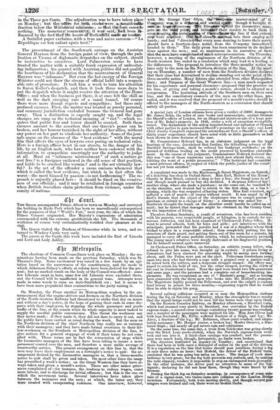The presentment of the Southwark outrage on the Austrian General
Haynau from the foreign-point of view, through the pub- lication at Vienna of diplomatic despatches on the subject, shbuld be instructive to ourselves. Lord Palmerston seems to have treated the matter with a suitably frank expression of unhesitat- ing indignation; his quarrel with Austrian politics did not qualify the heartiness of his declaration that the mistreatment of General Haynau was " infamous." But even the hot energy of the Foreign Minister could not thaw the stream of official habit into a respect- able rate of procedure. It took him a week to turn his attention to Baron Koller's despatch, and then it took three more days to put the despatch where it might receive the attention of the Home Office ; and when the business got there, it at once felt the chill as well as the dark creeping rate of a canal tunnel. Of course there were more decent regrets and sympathies ; but these only prefaced excuses. First, the matter was treated as purely personal, and summary jurisdiction excluded because the General had gone away. Then a distinction is eagerly caught up, and the legal changes are rung on the technical meaning of " riot "—which re- quires that public fear and terror should be created. Both these excuses amount to the assertion that our Queen's peace can be broken, and her honour tarnished in the sight of her allies, without any power on her part to vindicate her authority. Some of the jour- nals argue on the absence of the " best evidence " with the moral film that affects the eyes of lawyers ever poring on technical rules. Here is a foreign officer beset in our streets, to the danger of his life, by an English mob, who have neither been endowed with the information to sympathize unerringly nor the authority to judge at all. Must an "infamous mistreatment" of such a nature go scot free ? is a foreigner outlawed in the old sense of that position, and liable to be crushed like vermin ? and is the act virtually law- ful? Is the act of the offender a casus omissus whenever that which is called the best evidence, but which is in fact often the Worst—the most biassed by passion—is not forthcoming ? The re- proach is unjustly placed here : it should be fixed on the evasive- ness of our officials ; and it may be retaliated in foreign countries when British travellers claim protection from violence, under the comity of nations.


























 Previous page
Previous page